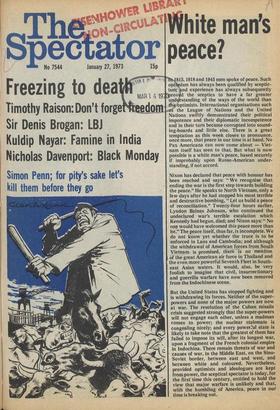815, 1918 and 1945 men spoke of peace. Such optttpism
has always been qualified by scepticism;t nd experience has always subsequently rovit d the sceptics to have a far greater und standing of the ways of the world than ths;toptimists. International organisations such as the League of Nations and the United Nations swiftly demonstrated their political impotence and their diplomatic incompetence and in their turn became corrupted into sounding-boards and little else. There is a great temptation as this week closes to pronounce, once more, that peace in our time is at hand. No Pax Americana can now come about — Vietnam itself has seen to that. But what is now possible is a white man's peace, based securely if improbably upon Russo-American understanding, if not accord.
Nixon has declared that peace with honour has been reached and says: "We recognise that ending the war is the first step towards building the peace." He speaks to North Vietnam, only a few days after he had stopped his most terrible and destructive bombing," Let us build a peace of reconciliation." Twenty-four hours earlier, Lyndon Baines Johnson, who continued the undeclared war's terrible escalation which Kennedy had begun, died; and Nixon says:" No one would have welcomed this peace more than he." The peace itself, thus far, is incomplete. We do not know yet whether the truce is to be enforced in Laos and Cambodia; and although the withdrawal of American forces from South Vietnam, is promised, there–is no mention of the great American air force in Thailand and the even more powerful Seventh Fleet in Southeast Asian waters. It would, also, be very foolish to imagine that civil, insurrectionary and guerrilla warfare have now been removed from the Indochinese scene.
But the United States has stopped fighting and is withdrawing its forces. Neither of the superpowers and none of the major powers are now at war. The resolution of the Cuban missile crisis suggested strongly that the super-powers will not engage each other, unless a madman comes to power; the nuclear stalemate is congealing nicely; and every power:u1 state is likely to take note that the greatest of them has failed to impose its will, after its longest war, upon a fragment of the French colonial empire in Indochina. There remain threats of war and causes of war, in the Middle East, on the Sino Soviet border, between east and west, and between white and coloured. Nevertheless, provided optimists and ideologues are kept from power, the sceptical spectator is today, for the first time this century, entitled to hold the view that major warfare is unlikely and that, with the humbling of America, peace in our time is breaking out.


































